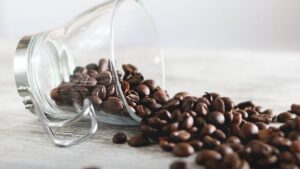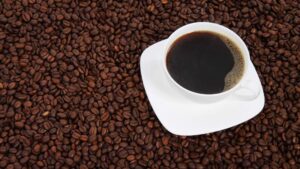
Coffee prices fell on Thursday amid expectations of a high harvest in Brazil, the world’s largest coffee supplier.
Arabica futures fell 0.2% to $3.0785 per pound at the end of trading in New York yesterday. This is the lowest price in five months.
Brazil’s new coffee crop, which will begin harvesting in a couple of months, could reach a record 75.8 million bags, Reuters reports, citing a forecast by EISA. One bag weighs 60 kg.
EISA expects the Arabica coffee harvest to amount to 48 million bags and the Robusta harvest to amount to 27.8 million bags.

Espresso in Ukraine has become more expensive again: in 2025, a cup of coffee cost an average of 41 hryvnia, which is 17% more than a year ago, according to the results of the Espresso Index study by Poster POS, conducted for the OpenDataBot service.
According to the study, the price of espresso in Ukraine has doubled since the start of the full-scale war, when a cup cost 21 hryvnia.
As of the end of December, the most expensive coffee in Ukraine is drunk in Lviv — 47 hryvnia per cup, Odessa — 45 hryvnia per cup, and Dnipro — 43 hryvnia per cup.
For the third year in a row, the cheapest coffee is in Khmelnytskyi — 33 UAH/cup, and it is also affordable in Zaporizhzhia and Kropyvnytskyi — 35 UAH/cup.
Over the course of the year, it has risen in price the most in the frontline Sumy region — by 26%. Last year, Sumy region was among the regions with the cheapest coffee.
There is currently no data available for the Ukrainian Autonomous Republic of Crimea and Luhansk region.
The Espresso Index is an economic indicator used to measure the cost of a standard serving of espresso in different cities around the world. It can be useful for comparing price levels and the cost of living in different places. This indicator helps to assess the difference in prices for the same goods and services in different countries and reflects purchasing power and inflation, according to Poster POS.
Ukrainian restaurant automation company Poster POS is a Ukrainian restaurant automation company that develops accounting software for the HoReCa system, which is installed on tablets. More than 50,000 establishments use the developer’s services.

In January-November 2025, Ukraine imported 44.18 thousand tons of coffee and 10.21 thousand tons of tea, which is 0.6% and 13.3% less than in the same period of 2024, according to the State Customs Service.
According to published statistics, in monetary terms, coffee imports increased by 39.2% to $352.18 million compared to $252.97 million for the same period a year earlier.
The main suppliers of coffee to Ukraine in the first 11 months of this year were Poland, which accounted for 15.5% of imports, or $54.67 million in monetary terms, Germany – 13.1% and $46.24 million, and Italy – 11.9% and $41.86 million.
A year earlier, the top three coffee suppliers to Ukraine for the corresponding period remained unchanged, except for their share in supplies: Poland (16.2%, $41.07 million), Italy (15.3%, $38.63 million), and Germany (13.1%, $33.09 million).
Tea imports during January-November 2025 decreased by 11.9% in monetary terms, to $38.92 million, compared to $44.19 million last year.
At the same time, the top three tea suppliers to Ukraine for the first 11 months of this year remained unchanged: Sri Lanka (30.3% or $11.8 million), Kenya (17.6% or $6.86 million), and China (12.5% or $4.85 million). Last year, these countries accounted for 31.6%, 20.1%, and 10.8% of the market, with tea supplies to Ukraine bringing them $13.96 million, $8.87 million, and $4.791 million, respectively.

The head of the Verkhovna Rada Committee on Finance, Tax and Customs Policy, Danylo Getmantsev, has drawn the attention of the Economic Security Bureau (ESB) and the State Tax Service (STS) to the coffee trade sector, which has become one of the most problematic in terms of tax payments, with state losses reaching UAH 1 billion.
“We all love to start our morning with coffee. But what is a habit for us has long been a sector with significant losses for the state. The problems begin at the customs clearance stage: every third ton of coffee is smuggled in annually, disguised as chicory or without any declaration at all. The leaders in customs clearance are the Kyiv and Lviv customs offices,” he wrote on his Telegram channel.
According to him, the problems do not end at customs: markets and large retail chains, divided into individual entrepreneurs, are also involved in the schemes of selling illegal coffee for cash, with losses amounting to over a billion hryvnia.
The MP reported that in the first nine months of 2025, the industry showed disappointing results, namely: the VAT payment rate increased to 1.45% (+0.28 p.p. compared to 2024), but it is still 0.46 p.p. lower than in 2023, and income tax fell to 0.85% (-0.09 p.p. compared to 2024).
According to Getmantsev, the main risk for the sector is the level of wages, where 89% of taxpayers pay below the market average salary of UAH 12,900, while, according to work.ua, the market average is UAH 22,000. At the same time, more than 18% of enterprises have an average salary below the minimum, which is evidence of the use of tax evasion schemes.
“It is obvious that a significant part of the industry is in the shadows. The question to the tax authorities is: what is the matter with tax control, where are the cash registers/payment terminals?” said the head of the parliamentary committee, calling on the BEB and the DNS to take urgent measures to de-shadow the coffee industry.

In early September, the National Securities and Stock Market Commission (NSSMC) registered the issue of series “B” bonds by Galka Trading House LLC (Lviv), a subsidiary of coffee and coffee products manufacturer Galka, in the amount of UAH 50 million.
According to information in the NSSMC register, the nominal value of the bonds is UAH 1,000, but information on the term of circulation and yield rate is not yet available.
The audit report for the first quarter states that at the end of March this year, as at the end of last year, bonds of the debut issue of TD Galka series “A” with a total nominal value of UAH 45.004 million were in circulation, while the issuer’s account had UAH 4.996 million.
The decision to issue new bonds without a public offering for another UAH 50 million was made by the participants on June 18 this year.
The Ukrainian-English joint venture Galka LLC (until 2004 – Galka Ltd.) was founded on the basis of the Lviv coffee factory. It is engaged in the production and sale of coffee, coffee products and coffee substitutes, and tea under the Galka trademark. It owns 90% of Galka Trading House LLC, and the remaining 10% is owned by Galinvest PZNFI under the management of Western Investment Group AMC.
According to the audit report, the ultimate beneficiaries of TD Galka through the Dutch company Nedinvestment B.V. are Volodymyr Pasternak – 25.42%, Yuriy Dubovoy and Yaroslav Volynets – 20.91% each, and their children Oleg and Andriy, who received 4.51% each in the period after November 2021, as well as Dutch citizen Jan Lavoie François with a 13.74% stake.
In the first quarter of 2025, TD Galka reduced its net profit by 10.2% to UAH 9.99 million, while its revenue increased by 64.2% to UAH 254.38 million.
In 2024, the company increased its net profit by 48.3% to UAH 56.65 million and its revenue by 17.2% to UAH 766.30 million.
According to its 2024 report, the parent company had five bond issues maturing in 2030-2034 with a total value of UAH 212.13 million.
The parent company’s net profit in 2024 increased by 36.2% to UAH 49.84 million, and revenue by 7.7% to UAH 86,186.3 million.

In January-June 2024, Ukraine imported 22,617 thousand tons of coffee, which is 6.1% less than in the same period a year earlier, when foreign purchases amounted to 24,094 thousand tons.
According to statistics released by the State Customs Service (SCS), spending on coffee purchases in the first half of the year rose by 36.9% to $173.403 million, compared to $126.684 million in the same period a year earlier.
The main suppliers of coffee to Ukraine were Poland, which accounted for 16.58% of imports, worth $28.749 million, Brazil – 12.75% and $22.104 million, and Germany – 12.49% and $21.653 million.
A year earlier, the top three coffee suppliers to Ukraine were Poland (16.83% worth $21.326 million), Italy (15.87% worth $20.1 million), and Brazil (12.31% worth $15.598 million).
Tea imports in January-June 2025 decreased by 22.87% to 5,452 thousand tons compared to 7,069 thousand tons in the same period last year. In monetary terms, imports in the first half of 2025 decreased by 16.26% and amounted to $20.957 million compared to $25.027 million last year.
At the same time, the three key suppliers of tea to Ukraine in January-June remained unchanged: Sri Lanka (30.13% worth $6.313 million), Kenya (17.77% worth $3.724 million) and China (14.63% worth $3.067 million). Last year, these countries accounted for 28.95%, 23.07%, and 11.33% of tea exports to Ukraine, bringing them $7.247 million, $5.774 million, and $2.835 million, respectively.